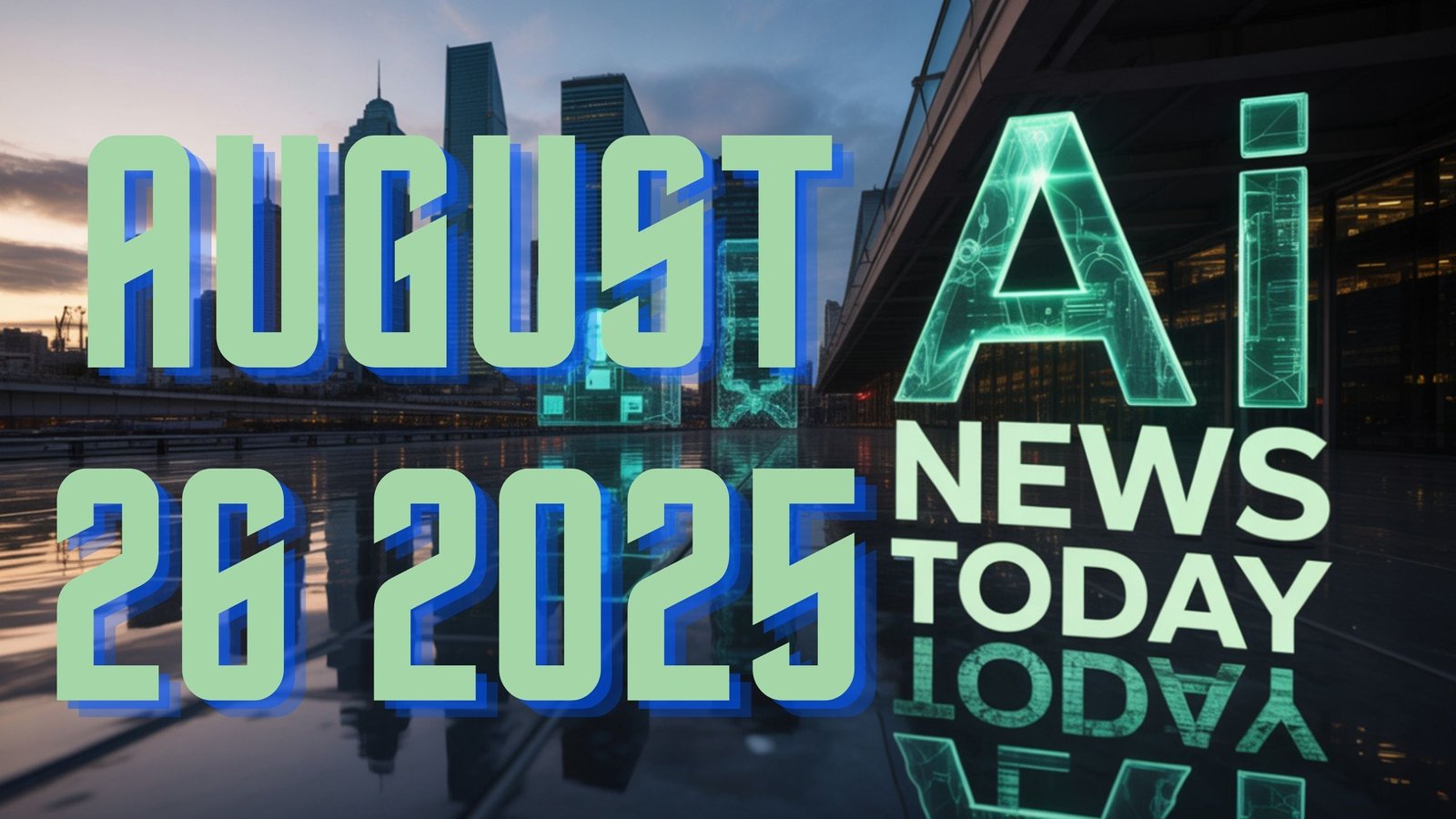AI News Daily — USA (Tuesday, August 26, 2025)– Artificial intelligence continues to dominate the technology and policy landscape in the United States. From landmark lawsuits involving industry titans to historic government deals and cutting-edge research, today’s roundup captures the latest developments shaping the AI sector on August 26, 2025.
Elon Musk’s xAI Files Lawsuit Against Apple and OpenAI
One of the most significant legal battles in the AI industry emerged yesterday as Elon Musk’s firm, xAI, filed a federal lawsuit against Apple and OpenAI. The lawsuit alleges that Apple has unfairly favored OpenAI by restricting access to xAI’s Grok app on the App Store, instead prioritizing ChatGPT integration across iPhones.
Musk argues that Apple’s decision represents a deliberate effort to suppress competition in generative AI. This case amplifies long-standing concerns about monopolistic practices in big tech, where a handful of companies wield disproportionate influence over AI deployment. If successful, this lawsuit could reshape the regulatory and competitive landscape, forcing Apple to loosen its device control over the AI ecosystem.
Industry experts suggest this legal clash could become a pivotal moment in defining fair competition in artificial intelligence markets, echoing earlier antitrust cases that transformed the technology sector.
US Government Signs Low-Cost Gemini AI Deal With Google
In a groundbreaking move, the US federal government finalized a deal with Google to deploy Gemini AI services across agencies at just $0.47 per agency. This ultra-low pricing underscores Google’s aggressive strategy to gain dominance in the public sector AI marketplace, where affordability and accessibility are key drivers.
This development follows recent agreements with OpenAI and Anthropic, marking a clear trend of government reliance on top AI firms for cost-efficient solutions. While these deals promise transformative benefits for federal agencies, they also raise questions about profitability, competition, and the exclusion of smaller AI companies.
Observers warn that such discounted partnerships could trigger price wars, potentially destabilizing the sector and making it harder for startups to compete. However, for the government, the move represents significant cost savings and a commitment to accelerating the adoption of AI tools for governance.
Tech Giants and States Expand AI Infrastructure Investments
Beyond the federal level, billions of dollars flow into AI infrastructure projects. Both technology giants and state governments are forging partnerships to build the next generation of AI-ready data centers and compute clusters.
These investments are designed to support massive-scale models that require enormous computational resources. With AI systems growing more complex each month, infrastructure is becoming the critical backbone for sustainable growth in the sector.
The competition to secure cloud resources, chip supply, and space-efficient data centers is intensifying, with firms like NVIDIA, Microsoft, and Google leading the charge. Analysts describe this wave of investment as the foundation of the AI economy of the next decade.
Silicon Valley’s AI Talent War Reaches New Heights
The demand for top AI talent has reached unprecedented levels. Reports confirm that elite researchers receive compensation packages valued at over $250 million, including salaries, bonuses, and stock options.
This trend reflects the fierce competition among Silicon Valley’s leading firms to secure the brightest minds in machine learning, robotics, and computational research. For many, the astronomical paychecks are justified by the potential trillions in market value that AI breakthroughs can generate.
However, the talent war is also fueling inequality, making it nearly impossible for startups and academic institutions to compete with the financial firepower of tech giants. As a result, concerns are growing about a brain drain from universities and smaller firms into corporate labs.
NVIDIA Unveils New Solutions for AI Data Center Constraints
NVIDIA introduced innovations to optimize data center space and efficiency to address a critical bottleneck in AI infrastructure. Generative AI models requiring exponential computational resources, physical space, and energy usage have emerged as top challenges for global scalability.
The company’s new solutions focus on modular data centers, power-efficient GPUs, and high-density hardware designs, enabling enterprises to maximize capacity without proportional increases in physical footprint.
By solving these constraints, NVIDIA positions itself as a chip leader and a holistic infrastructure provider, a strategy that cements its dominance in the hardware ecosystem underpinning AI development.
Breakthrough in AI-Powered Climate Models
The University of Washington unveiled a new AI model capable of simulating 1,000 years of Earth’s climate in a single computational run. This breakthrough, highlighted in earlier reports, demonstrates the transformative potential of artificial intelligence in climate science and sustainability research.
Such advancements promise faster, more accurate predictions of global climate patterns, equipping policymakers with vital tools to combat climate change. Moreover, compressing centuries of simulations into hours accelerates scientific discovery and reduces reliance on massive computing resources.
The research illustrates how AI is not limited to commercial applications but is increasingly critical in scientific and environmental domains.
Policy Concerns: AI Bubble and Job Disruption Risks
While investment and innovation soar, concerns about the AI bubble continue to gain traction. Analysts warn that valuations of AI firms are rising faster than sustainable revenue models, creating parallels with the dot-com bubble of the late 1990s.
At the same time, the risk of mass job disruption looms large. Automation of white-collar and creative roles has sparked intense debates in Washington, Silicon Valley, and labor organizations. Calls for ethical safeguards, stronger regulation, and workforce retraining programs are growing louder.
Government and business leaders are under pressure to balance the economic promise of AI with the societal risks of displacement. This balancing act will define the political discourse around artificial intelligence in the coming years.
Ongoing Shifts in Investor and Corporate Sentiment
Recent reports describe a “vibe shift” in investor attitudes toward AI. While enthusiasm remains high, business models, profitability, and sustainability are increasingly scrutinized.
Companies that once raced to deploy models at all costs are now more cautious, focusing on cost efficiency and long-term adoption strategies. This shift mirrors a broader sentiment in the technology sector, where sustainability and practicality are gaining importance over hype.
For smaller AI startups, this environment presents both challenges and opportunities. While funding is harder to secure, focusing on viable business models may create openings for firms offering niche, practical solutions.
Follow-Ups: Legal and Corporate Narratives Continue to Evolve
The Musk lawsuit against Apple and OpenAI represents a significant escalation in the fight against AI monopolization, reinforcing concerns already raised in prior weeks. The outcome of this case will likely set precedents for how exclusive partnerships and platform control are regulated in the AI space.
Similarly, the Google-Government Gemini AI deal builds on the growing wave of public sector partnerships. These contracts shape the future of AI adoption in governance, often highlighting the tension between cost savings and market fairness.
Both stories are expected to dominate discussions in the coming weeks as regulators, businesses, and the public grapple with the implications of these powerful alliances and disputes.
Wrap Up
The daily developments in the US AI sector illustrate a dynamic and high-stakes environment. Artificial intelligence is reshaping America’s technological, legal, and economic landscape, from billion-dollar talent wars and government partnerships to lawsuits that may redefine the industry’s future. As these stories unfold, stakeholders must navigate innovation opportunities alongside the risks of concentration and disruption.

Selva Ganesh is a Computer Science Engineer, Android Developer, and Tech Enthusiast. As the Chief Editor of this blog, he brings over 10 years of experience in Android development and professional blogging. He has completed multiple courses under the Google News Initiative, enhancing his expertise in digital journalism and content accuracy. Selva also manages Android Infotech, a globally recognized platform known for its practical, solution-focused articles that help users resolve Android-related issues.




Leave a Reply